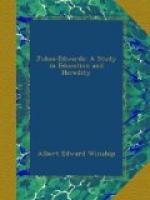It is not surprising to find that the ancestors of Mr. Edwards were cradled in the intellectual literary activities of the days of Queen Elizabeth. The family is of Welsh origin and can be traced as far as 1282, when Edward, the conquerer, appeared. His great-great-grandfather, Richard Edwards, who went from Wales to London about 1580, was a clergyman in the Elizabethan period. Those were days which provided tonic for the keenest spirits and brightest minds and professional men profited most from the influence of Spencer, Bacon, and Shakespeare.
Among the first men to come to the new colonies in New England was William, a son of this clergyman, born about 1620, who came to Hartford, where his son Richard, born 1647, the grandfather of Jonathan, was an eminently prosperous merchant. Richard was an only son. The father of Jonathan, Timothy Edwards, was an only son in a family of seven. Aristocracy was at its height in the household of the merchants of Hartford in the middle of the seventeenth century.
Harvard was America’s only college, and it was a great event for a young man to go from Hartford to Harvard, but this Timothy Edwards did, and he took all attainable honors, graduating in 1661, taking the degrees of A.B. and A.M. the same day, “an uncommon mark of respect paid extraordinary proficiency in learning.” This brilliant graduate of Harvard was soon settled over the church at East Windsor, Conn., where he remained sixty-five years as pastor.
Who can estimate the inheritance which comes to a child of such a pastor who had been born in a merchant’s home. In the four generations which stood behind Jonathan Edwards were two merchants and two preachers, a grand combination for manly and intellectual power.
In this pastor’s home Jonathan Edwards was born October 5, 1703. Those were days in which great men came into the world. There were born within fifteen years of Jonathan Edwards a wonderful array of thinkers along religious and philosophic lines, men who have molded the thought and lives of a multitude of persons. Among these intellectual giants born within fifteen years of Mr. Edwards were John Wesley, George Whitefield, Swedenborg, Voltaire, Rousseau, and Hume.
In order to appreciate the full significance of Mr. Edwards’ legacy to the world, it is well to study some conditions of his life. It would not be easy to find a man whose surroundings and training in childhood were better than those of Jonathan Edwards. The parsonage on the banks of the Connecticut was a delightful home. His parents and his grandparents were ideal American Christian educated persons. He was prepared for college by his father and mother. He was a devout little Christian before he was twelve years of age. When he was but ten years old he, with two other lads about his own age, made a booth of branches in a retired spot in a neighboring wood, where the three went daily for a season of prayer.




